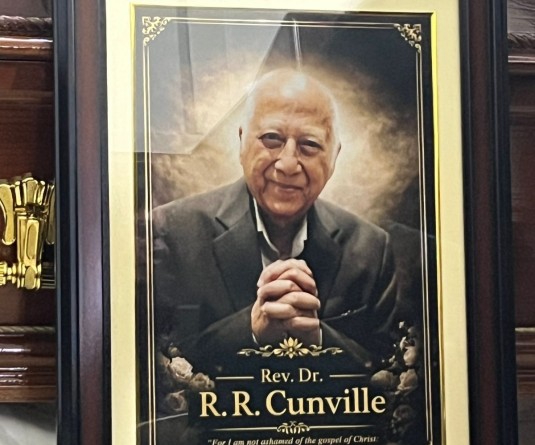
Vikiho Kiba
The principle that “every action has an equal and opposite reaction” is familiar to most through the lens of classical physics, as articulated in Newton’s Third Law of Motion. Simultaneously, the ethical and spiritual traditions of the world have long asserted a parallel truth:
moral and immoral actions carry consequences, sometimes immediate, often delayed, yet invariably real. From the Hindu notion of karma to the biblical dictum, “Be sure your sin will find you out” (Numbers 32:23), human societies have consistently recognized that deeds, whether virtuous or maliciousbear a weight that eventually manifests. This duality, bridging science and spirituality, invites critical reflection on how societies, particularly those grappling with systemic ethical failings, understand and respond to the consequences of action.
The Physics of Deeds: Cause, Effect, and Societal Motion: Newton’s Third Law is straightforward in its statement: for every force exerted, there is an equal and opposite force returned. While this law primarily describes the behavior of physical bodies, it provides a metaphorical framework for considering human action. When applied to social, political, and moral contexts, the law implies that human actions, whether corrupt practices, ethical lapses, or acts of kindness, generate reactions that are proportionate, though not always immediate.
In societies such as Nagaland, where systemic corruption and nepotism have long plagued governance and civic institutions, the law of action and reaction finds tangible expression. Nepotistic appointments, embezzlement, and the manipulation of public office do not exist in a vacuum; they provoke societal forces, discontent, distrust, legal scrutiny, and, ultimately, the erosion of communal cohesion. Just as a rocket propels itself forward only by pushing against another body, societal advancement or decline is inexorably linked to the forces generated by human behavior. Misdeeds, left unchecked, gather momentum, producing a backlash as inevitable as the recoil of a gun.
Karma: The Ethical Dimension of Reciprocal Action. The concept of karma deepens this discussion by emphasizing ethical intentionality. In Hindu, Buddhist, and Jain traditions, karma is the mechanism through which moral and immoral deeds generate consequences that may unfold across time, even spanning lifetimes. Unlike Newtonian mechanics, where reaction is instant and predictable, karmic consequences are filtered through moral and cosmic frameworks, often manifesting in ways that challenge human comprehension. Nonetheless, the principle is unambiguous: ethical failures accumulate, and the universeseen as inherently moral, eventually restores equilibrium.
Transposed to modern societal life, karma serves as both a caution and a diagnostic lens. Leaders and citizens who engage in unethical behavior may not witness immediate repercussions, but history and empirical evidence suggest eventual accountability. The recent history of governance and ecclesiastical leadership in Nagaland offers compelling examples. Decisions made to favor personal gain over communal good, whether through nepotistic hiring in educational institutions, misallocation of funds, or manipulation of policyinevitably precipitate societal reaction. Public trust erodes, civic engagement wanes, and institutional legitimacy suffers, reflecting the karmic principle that human actions, regardless of concealment or rationalization, carry consequences.
Scriptural Resonance: “Your Sin Will Find You Out” Biblical scripture echoes this motif with remarkable clarity. Numbers 32:23 declares, “Be sure your sin will find you out,” asserting a universal principle: moral transgressions, however hidden, will eventually yield exposure and consequence. Unlike Newtonian law, which is purely mechanical, this scriptural assertion emphasizes accountability within the moral and social order. Sin, here, is not merely a private transgression; it has public ramifications. The exposure of wrongdoing is part of the natural and divine order of societal justice, which, while perhaps delayed, is inevitable.
In practical terms, this insight challenges communities and individuals to confront corruption, dishonesty, and moral negligence not only as ethical failings but as practical liabilities. Governance, business, and social relations are interdependent networks where ethical lapses produce tangible negative feedback. A society that ignores the inevitability of moral reaction risks structural destabilization; the very social bonds that sustain communal life are weakened when actions contrary to justice and integrity go unchecked.
The Interplay Between Immediate and Delayed Consequences: Both physics and ethics highlight the inevitability of reaction, yet the timing and visibility of consequences often differ. Physical reactions are immediate and measurable: the hand recoils from heat; the ball rebounds from a wall. Moral and social consequences, however, unfold over time, influenced by complex variables—culture, law, communal memory, and leadership.
This temporal lag presents a particular challenge. Many actors engage in unethical practices under the assumption that delayed consequences are tantamount to impunity. However, just as the force exerted by a bowstring is stored and later released when the arrow is loosed, unethical actions generate latent energy that eventually manifests. Corruption, when chronic, often culminates in a crisis: institutional collapse, legal prosecution, or societal unrest. Even when the immediate impact is concealed, the cumulative effect of unethical behavior is undeniable.
Consequences Beyond the Individual: Societal and Cultural Repercussions: The metaphor of reaction extends beyond individual accountability. In the context of communities, unethical action produces cascading effects. In Nagaland, for instance, nepotism in educational institutions not only undermines fairness but compromises intellectual development and civic leadership. Similarly, financial improprieties in governance erode trust and limit societal progress. These consequences are both moral and practical, illustrating that the law of reciprocal action operates across multiple layers of society.
From a cultural perspective, repeated unethical action reshapes societal norms. When corruption becomes normalized, the moral compass of the community shifts, creating a feedback loop that further entrenches unethical behavior. Here, the concept of karma resonates: moral law is not just punitive but restorative, seeking equilibrium and re-establishing ethical norms over time.
The Scholar’s Perspective: Integrating Physics, Ethics, and Practical Wisdom. A critical analysis of “karma or physics” as frameworks for understanding consequences highlights their complementary value. Physics provides the structural certainty: actions produce measurable reactions. Ethics and spirituality offer depth: actions bear consequences within moral, societal, and cosmic frameworks. Together, they underscore an essential truth for scholars, policymakers, and citizens alike: human behavior is consequential, and ignoring the principle of action and reaction invites instability, injustice, and societal decay.
For scholars, the metaphor of physics applied to social systems is more than poetic; it encourages empirical observation of cause and effect in governance, economy, and social behavior. Similarly, ethical and religious frameworks provide a normative guide, emphasizing that the rightness or wrongness of an action is inseparable from its consequences. In combination, these perspectives offer a robust analytical lens: they caution against short-term expediency, advocating for long-term responsibility and integrity.
Conclusion: The Inevitability of Reckoning. Ultimately, whether framed as Newtonian physics, karmic principle, or biblical justice, the message is consistent: actions produce consequences. The interplay of forces, physical, ethical, social, is inevitable, inescapable, and measurable, though often in forms that require careful discernment. For contemporary societies, particularly those grappling with endemic corruption or moral complacency, this principle demands attention. Ethical lapses are not private matters; they reverberate through institutions, families, and communities, shaping societal health and legitimacy.
The challenge, then, is proactive engagement: cultivating integrity, enforcing accountability, and embedding ethical reflection in the fabric of social life. To ignore the principle of inevitable reaction is to invite collapse, both moral and structural. As Newton observed the physical world and sages contemplated moral law, modern societies must recognize that the universe, physical, ethical, and socialoperates on the certainty of consequence. What we sow, whether in action or intention, will indeed be reaped, sooner or later.
In a land where promises of progress are often undermined by nepotism, corruption, and moral compromise, the convergence of karma, physics, and scripture serves as a critical reminder: no deed is without consequence, and no wrongdoing can remain hidden indefinitely. Every action, like the recoil of a force, carries with it an inevitable response, shaping not only individual fate but the trajectory of entire communities.





